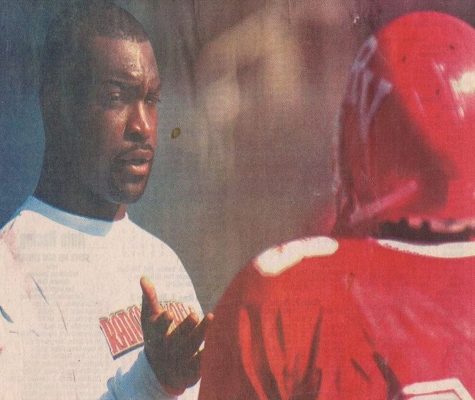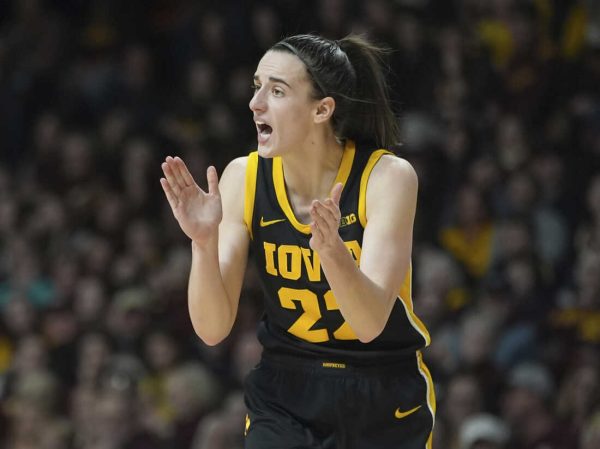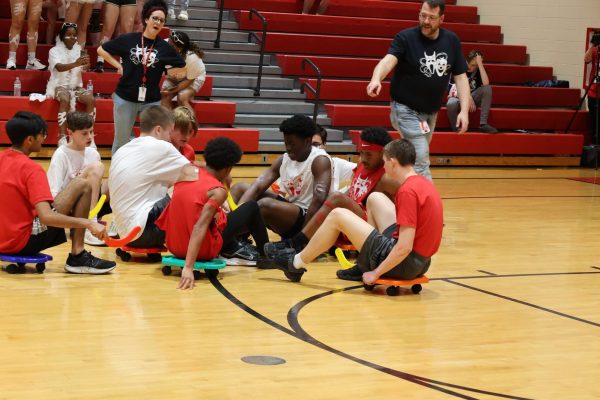“Just go and go and go”: advice for high school athletes from someone who has been there, done that
Math teachers Mr. Collura and Mr. Jenkins sat down and talked all things high school sports
Mr. Collura has a long history of working with high school athletes, both in and beyond RV
May 13, 2022
In this Q and A, I sat down with RV math teacher Mr. Sam Jenkins and asked him about some of the current topics amongst high school and college athletics. Mr. Jenkins, a former multi-sport athlete, led RV to a football sectional championship in 1987 before playing running back at Temple University. After his time as a D1 running back he coached for a number of prestigious institutions, including Camden High School, Temple University, Tyler Junior College in Texas, as well as a number of professional and semi-professional teams, including the NFL in Europe, the Philadelphia Phoenix, and the Super Bowl-winning Philadelphia Eagles.
Here are some words of advice for high school athletes looking to capitalize on their talents beyond senior year.
Mr. Collura: The transfer portal [a digital tool that was created in 2018 to streamline the college transfer process for student-athletes] has been a common trend with high school and college athletes. What would you say to high school athletes thinking of doing this?
Mr. Jenkins: It’s hard to say one bit of advice that can cover all cases and the variables are different between the levels. If you’re leaving because of playing time or if you don’t like the style of coaching, I’d say stick it out and do what you have to do to get what you want. At the college level if you have family issues or don’t fit into the school, those are good reasons to switch schools. College athletes should be empowered to make decisions for their lives, but not at the risk of giving up without trying to beat out the person in front of them.
My advice is to take in the coaching, or exhaust every option to try and achieve their goals. Student athletes should really try their best to work it out, but there are valid reasons for college kids to leave. I personally would stick it out and try to beat the person in front of me especially at the high school level.

Mr. Collura: Many athletes specialize and spend their off seasons with trainers or playing 7-on-7. What are your thoughts on multi-sport athletes, and what is your advice for high schoolers?
Mr. Jenkins: My advice would be to play as many different sports that you can play. Your body and mind are best served by getting exposed to different movements, coaching styles and strategies. It’s similar to school, where you have multiple teachers to give you a well rounded general education. The more that you are exposed to the better overall person and/or athlete you will become.
Mr. Collura: You have been around many college and professional athletes. What would you say were some of the main characteristics that made these individuals stand out from the rest?
Mr. Jenkins: They don’t get tired, injured or go full speed every play. They just go and go and go. The stars I’ve seen up close are just remarkable in their consistency and effort. They give the same things all the time no matter what they’re doing. They make special plays in practice all the time. The people around them are not surprised when those things happen in the game because the diving plays, game winning shots, and amazing tackles are things that they do everyday.
Mr. Collura: Sometimes with high school sports it seems like everyone has an approach of “D1 or bust” and many athletes focus so much on protecting a potential D1 persona. What is your advice to athletes consumed with portraying that they are D1?
Mr. Jenkins: Look at the numbers. It’s such a low percentage that is D1. It’s more important to go to a place with your appropriate skill level and your ability to finance college. You want to get to a level that is best for you. Even if you have aspirations of playing beyond high school there are schools that are small schools D1, D2 and D3, and HBCU’s that get guys drafted all the time. Finding a place that you fit in and works best for you should be the approach and mindset. If you’re D1, great, but if you’re not, it’s not a bad thing and shouldn’t be looked at like a disappointment.
Mr. Collura: What were some of your best memories as an RV athlete?
Mr. Jenkins: The general excitement of my teammates or players in any of the sports I played are what I remember. The look on a teammates face as they came off the field after they made a big play or I made a big play are the special moments to me. I loved the team atmosphere, and even if I got too big for my shoes, the other players put me in my place in a hurry and no one outside would have seen those moments. To me it was so great because they weren’t scared to say what they had to say and everyone had egos, but everyone respected each other enough to say when enough is enough.
The seniors that I won the championship with in high school won a championship at 100 lbs [as] freshman, and then as seniors. The respect and relationships amongst my teammates were the best memories. There were a lot of moments with our championship game, parade, and big plays, but it wasn’t about all that. It’s more about the feelings than the moments for me. Those feelings are things that I’ll never forget.
Mr. Collura: Many adults talk about how sports have changed at the youth level. Would you say there are any obvious changes and if so what are they?
Mr. Jenkins: I don’t think kids have changed at all. What has changed is that adults allow kids to do things they didn’t do before and how adults react to stuff. Kids would be the same now that they were 30 years ago if we didn’t change . Adults are too busy trying to make the path easier that affords less creative children and we see changes in the game. The expectations, parents and all the stuff on the field have changed. Parents may have got your cleats, but they would tell you to just get out there and play. Being forced to figure things out and not have the easy way out made us better in the long run. Not having those opportunities that kids have now to avoid the difficulties was better for us.












